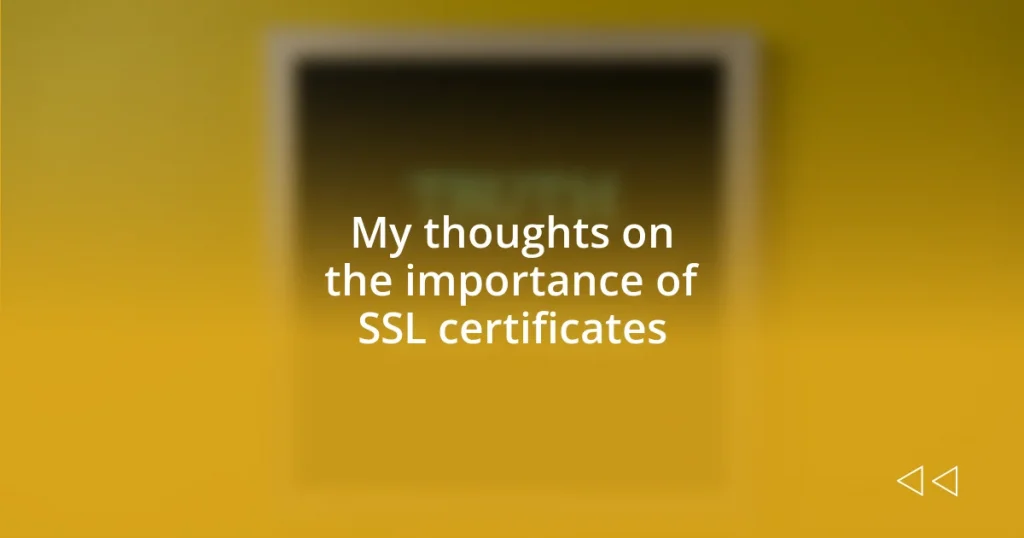Key takeaways:
- SSL certificates protect sensitive information through encryption, build user trust, and enhance website visibility and search engine rankings.
- Selecting the appropriate SSL certificate is crucial, particularly for e-commerce, and organizations should ensure they understand the validation types.
- Ongoing SSL maintenance and a comprehensive security strategy are essential; installing an SSL certificate alone does not guarantee complete security.
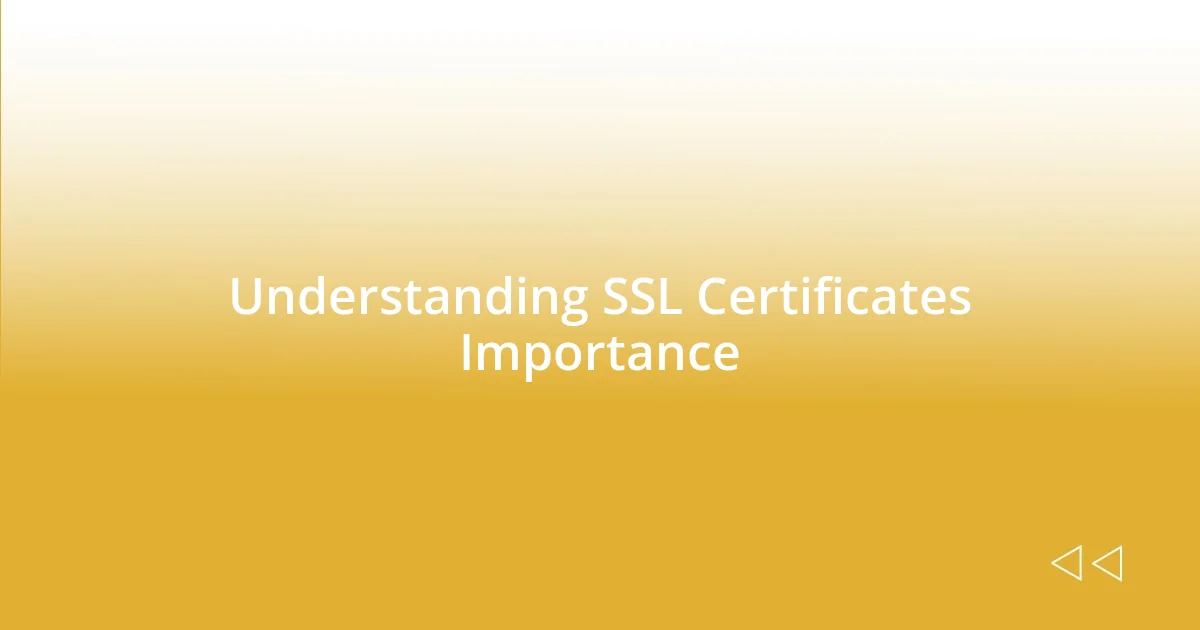
Understanding SSL Certificates Importance
When I first ventured into the world of online business, I didn’t fully grasp the significance of SSL certificates. It was only after a friend shared a harrowing story about a data breach that I realized their importance. Suddenly, it clicked: SSL certificates are not just technical jargon; they protect sensitive information and build trust between businesses and their customers.
Imagine visiting a website only to see that ominous “Not Secure” message in your browser. How safe would you feel providing your credit card details there? Personally, I’ve backed away from sites that lack SSL, which highlights how people’s perceptions of security can influence their online transactions. This underscores just how essential these certificates are in fostering customer confidence.
Moreover, the implications of not using SSL can extend beyond losing a sale—think of the reputational damage that comes with it. I’ve seen companies struggle to regain customer trust after a security mishap. Isn’t it worth the investment to ensure your site is secure and to show your visitors that you genuinely care about their protection? With cyber threats lurking around every corner, understanding the value of SSL isn’t just an option; it’s a necessity.
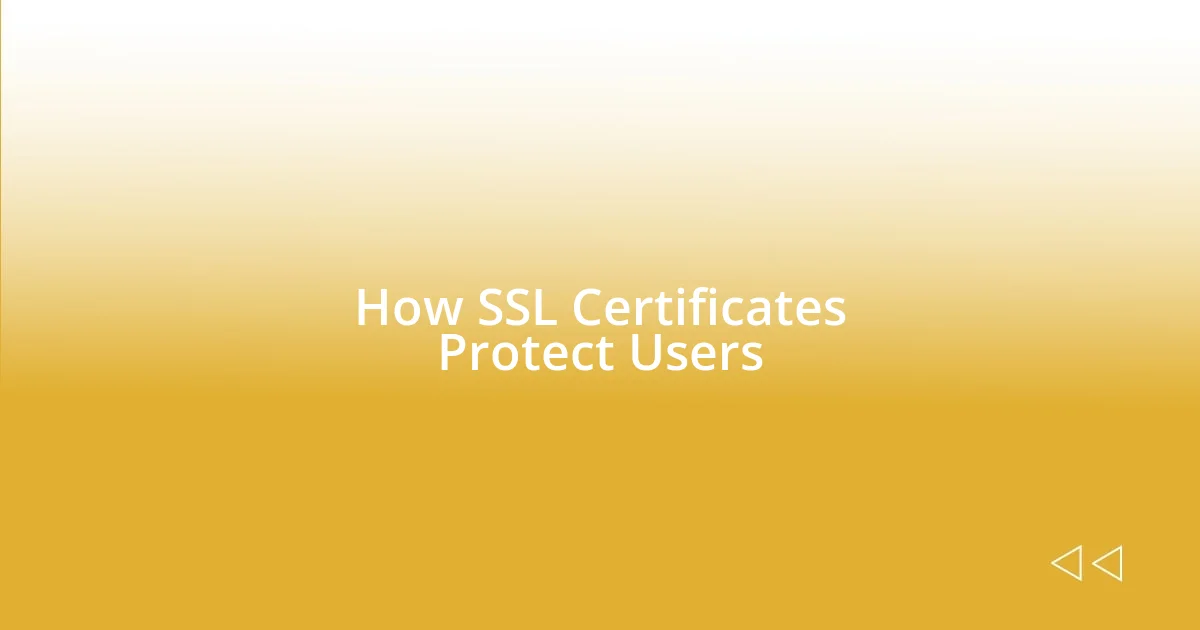
How SSL Certificates Protect Users
SSL certificates play a crucial role in protecting users by encrypting the data exchanged between a web server and a browser. I recall a time when I accidentally submitted my personal information on an unencrypted site. It felt like I had opened Pandora’s box, filled with anxiety over potential scams. Encryption safeguards this data, ensuring that even if cybercriminals intercept it, they can’t decipher the information. This simple measure creates a secure communication channel that users can trust.
Furthermore, SSL certificates validate the identity of websites. I remember shopping for a new laptop online and came across a site that seemed legitimate but lacked SSL. The moment I saw that “Not Secure” warning, I hesitated. I ended up choosing a different retailer with SSL certification. This validation reassures users that they’re dealing with a credible business and not an impostor, significantly reducing the risk of falling victim to phishing attacks.
Lastly, when websites use SSL certificates, they often receive a boost in their search engine rankings. This is something I noticed when diving into SEO strategies for my own site. Search engines favor secure sites, turning user protection into a competitive advantage. By prioritizing SSL security, businesses not only protect their users but also enhance their visibility online, demonstrating that customer safety is a priority.
| Feature | Benefit |
|---|---|
| Data Encryption | Protects sensitive user information by making it unreadable to unauthorized parties. |
| Identity Verification | Ensures users are interacting with legitimate businesses, reducing the risk of scams. |
| Search Engine Ranking | Improves visibility on search engines, attracting more visitors and enhancing credibility. |
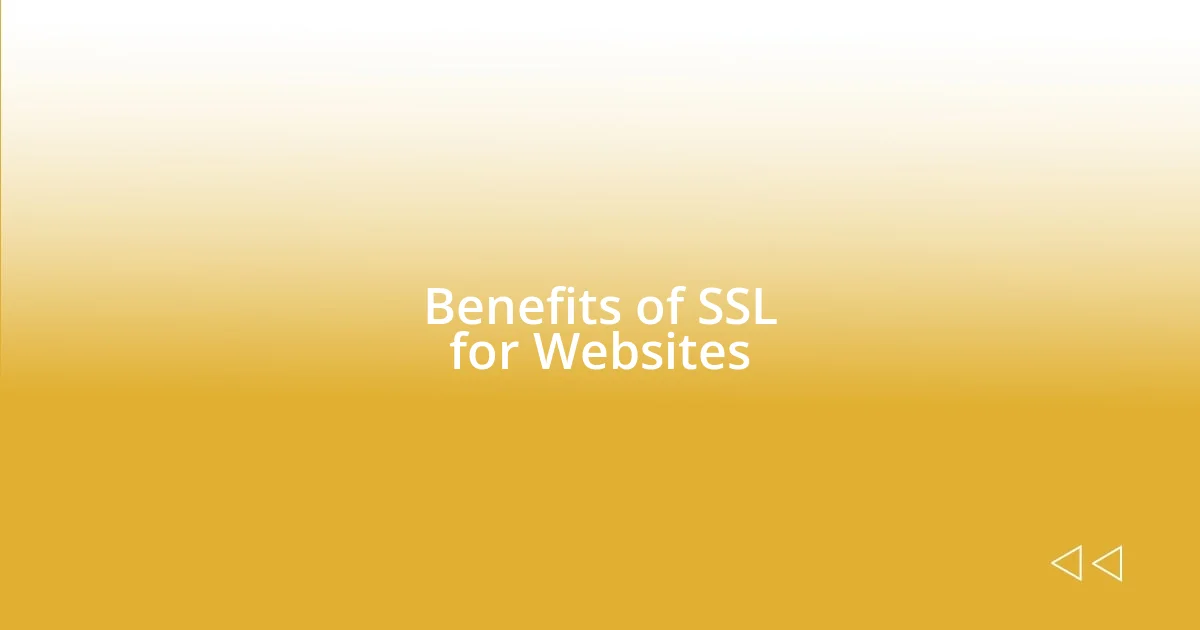
Benefits of SSL for Websites
When I began taking my online business seriously, I discovered that SSL certificates offer tangible benefits that I hadn’t fully appreciated before. One standout advantage is the trust factor they instill in potential customers. I remember a point when I was shopping for a birthday gift for a friend. I came across a great deal but the site didn’t have SSL—I simply couldn’t bring myself to enter my payment info. This experience made me realize that a secure connection is often the first signal of trust for users.
Here are some key benefits of SSL for websites:
- Enhanced Security: SSL encrypts data, providing a robust shield against cyber intrusions.
- Building Trust: Secured sites inspire confidence. Users are more likely to complete transactions when they see that little padlock icon.
- Search Engine Preferences: Having SSL can boost your site’s ranking, making it easier for potential customers to find you online.
As I dove deeper into the world of web development, I also learned about the amazing performance improvements linked to SSL. I distinctly remember implementing SSL on my site and noticing quicker load times. It felt like giving my website an upgrade. This experience underscores how SSL isn’t just about safety; it’s about quality and user experience as well.
- Faster Load Times: SSL connections can enhance site performance, leading to an improved user experience.
- Improved SEO: A secured site can positively influence your search engine ranking, drawing in more traffic.
- Regulatory Compliance: Having SSL helps in adhering to data protection regulations, showing customers that you take their privacy seriously.
Incorporating SSL into a website is like adding a robust lock to your front door. In my experience, both users and search engines appreciate that level of assurance, and it’s one step that can yield significant returns in establishing an online presence.
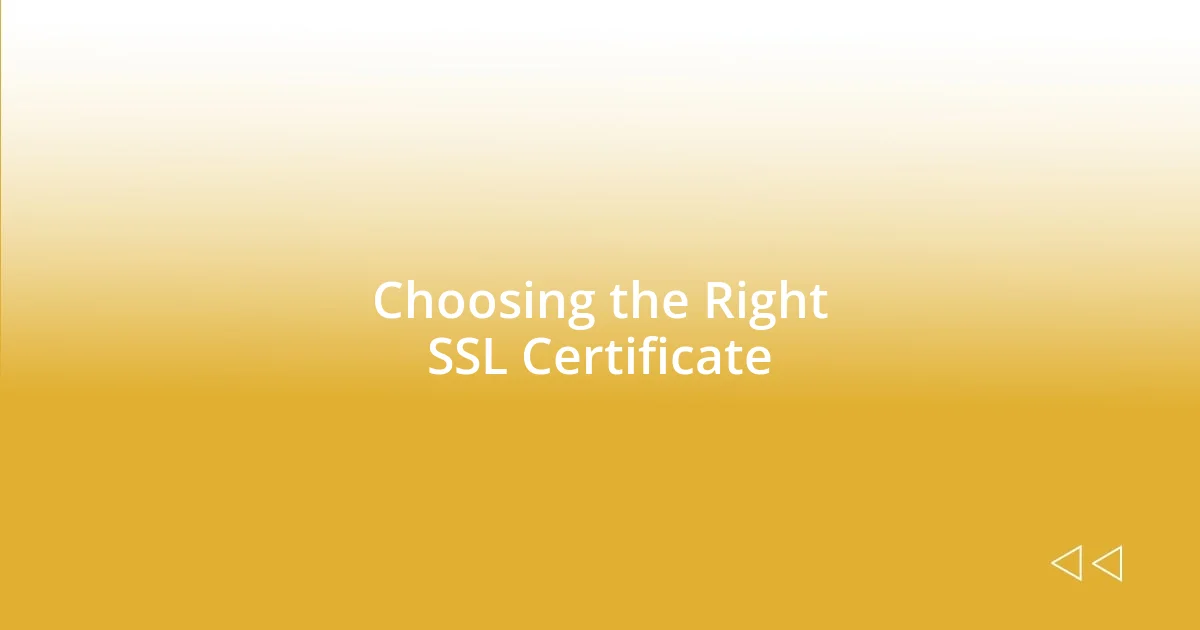
Choosing the Right SSL Certificate
Choosing the right SSL certificate can seem overwhelming at first, but it’s essential to consider the specific needs of your website. When I was selecting one for mine, I realized that different certificates cater to different types of businesses. For instance, if you’re running an online store, a multi-domain wildcard certificate might be ideal for protecting several subdomains under one main domain. Have you ever thought about how much easier it could be to manage your security that way?
I remember feeling unsure about which certificate to go for, so I reached out to a few colleagues in the industry. They emphasized the importance of understanding what kind of validation each SSL offers. Domain Validation (DV) might suffice for personal blogs; however, for e-commerce and professional sites, I found that Organization Validation (OV) and Extended Validation (EV) were more appropriate. Seeing the green address bar with my business name brought me a sense of pride and reassurance. It’s like wearing a badge that says, “We mean business!”
Also, consider the support and installation processes when choosing your SSL certificate. During my early days, I opted for an SSL provider that offered excellent customer support. I encountered some bumps during installation, but their responsive team guided me through it seamlessly. That experience taught me that having reliable support can save you from potential headaches down the line. What good is a certificate if you can’t get help when you need it, right?
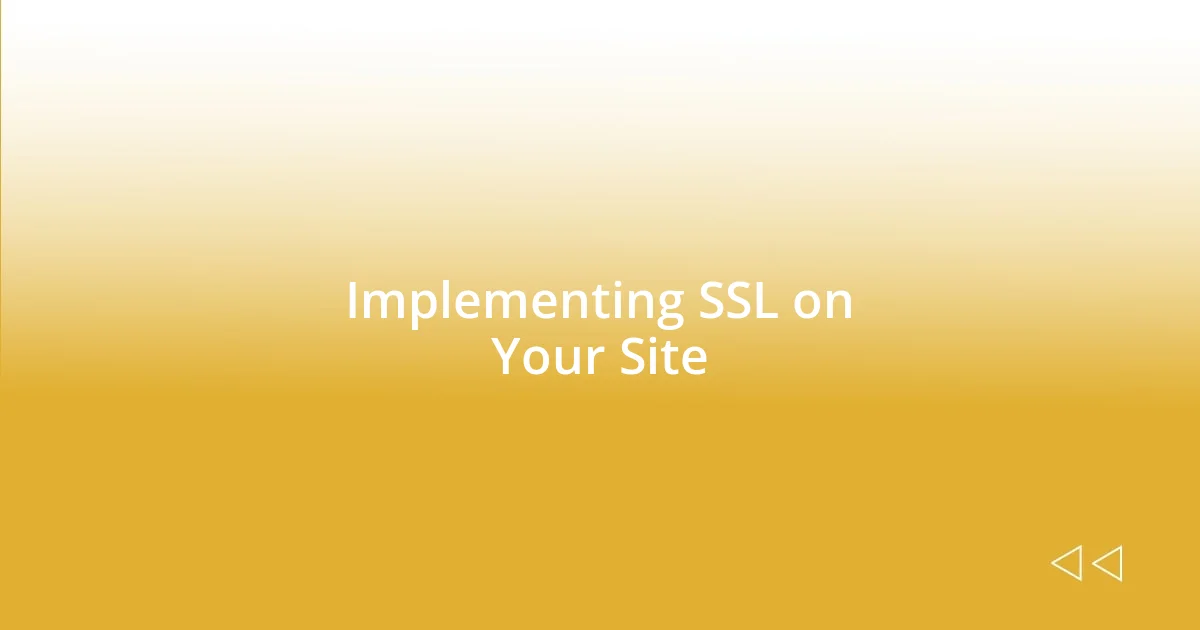
Implementing SSL on Your Site
Implementing SSL on your site can feel like a daunting task, but I genuinely believe it’s a worthwhile investment. When I first set out to secure my website, I found that many hosting providers offer straightforward SSL installation options. It was reassuring to discover that I didn’t need to be a tech wizard; a few clicks and I had my SSL certificate in place. Have you ever felt that rush of accomplishment when you check something off your to-do list? This was just like that for me.
After the installation, I had this realization about the importance of testing the SSL set-up. I remember nervously checking if everything worked correctly. Tools like SSL Labs made this process easy and gave me peace of mind. I could see how well my site was performing under the secure protocol, and that little green padlock became a badge of honor for my brand. Has there ever been a moment when you wanted to showcase your dedication to safety? That was mine.
Once SSL was running, I noticed the difference not just in security, but also in the user experience. I felt more confident promoting my site, knowing that I was offering visitors a safe environment. You might be surprised at how a simple SSL implementation fosters a sense of community around your brand. In my experience, it not only reassured my customers but also paved the way for more engagement and trust as they browsed my offerings. It’s funny how something so technical can have such a human impact, isn’t it?
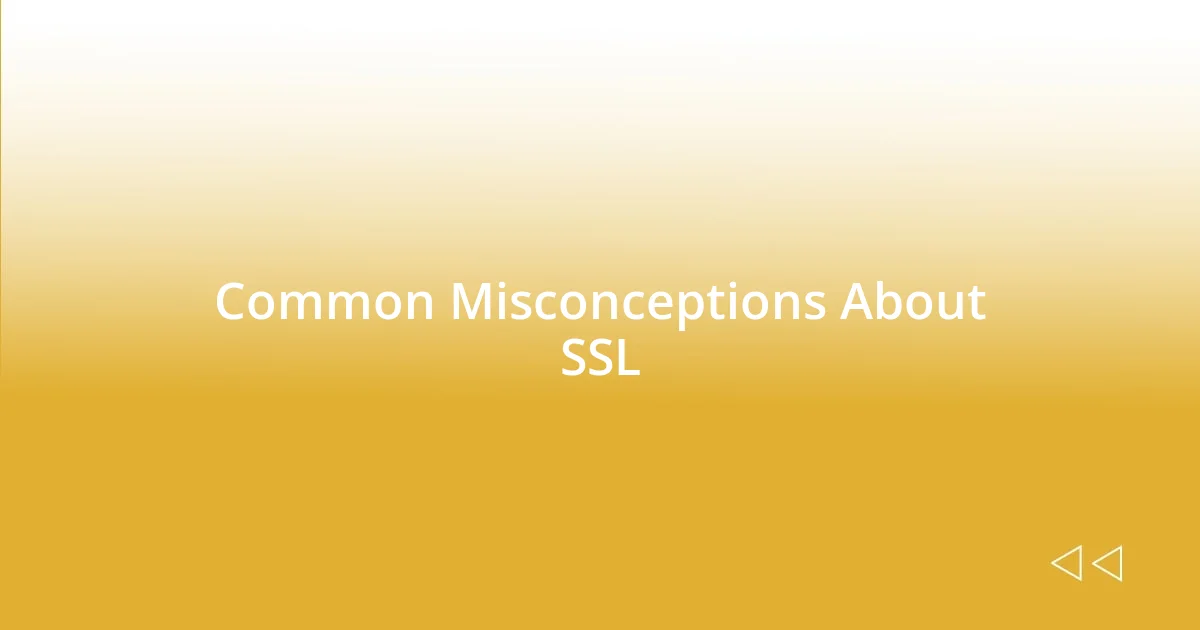
Common Misconceptions About SSL
It’s fascinating how many people still believe that SSL certificates are only necessary for e-commerce sites or those handling sensitive information. I used to think that way until I learned that even personal blogs and informational websites can benefit greatly from having SSL in place. It’s not just about security; it’s about establishing trust with every visitor. Imagine stumbling upon a site without HTTPS; wouldn’t you hesitate to engage with it?
Another common misconception is that once you install an SSL certificate, your site is secure forever. I found out the hard way that ongoing maintenance and renewal are crucial. I remember missing a renewal deadline, which resulted in my site displaying “Not Secure.” That brief period was uncomfortable, as I could feel the trust I had built with my audience slipping away. Have you ever felt a sinking feeling when realizing something you thought was secure suddenly wasn’t?
Lastly, some folks think that having an SSL certificate guarantees complete immunity against cyber threats. While SSL definitely encrypts data and protects against certain attacks, it doesn’t mean you’re invulnerable. I learned this after implementing SSL but neglecting my overall site security. It’s akin to locking your front door but leaving the windows wide open. Did I put too much faith in one single layer of protection? I sure did, and it taught me the importance of a comprehensive security approach.










